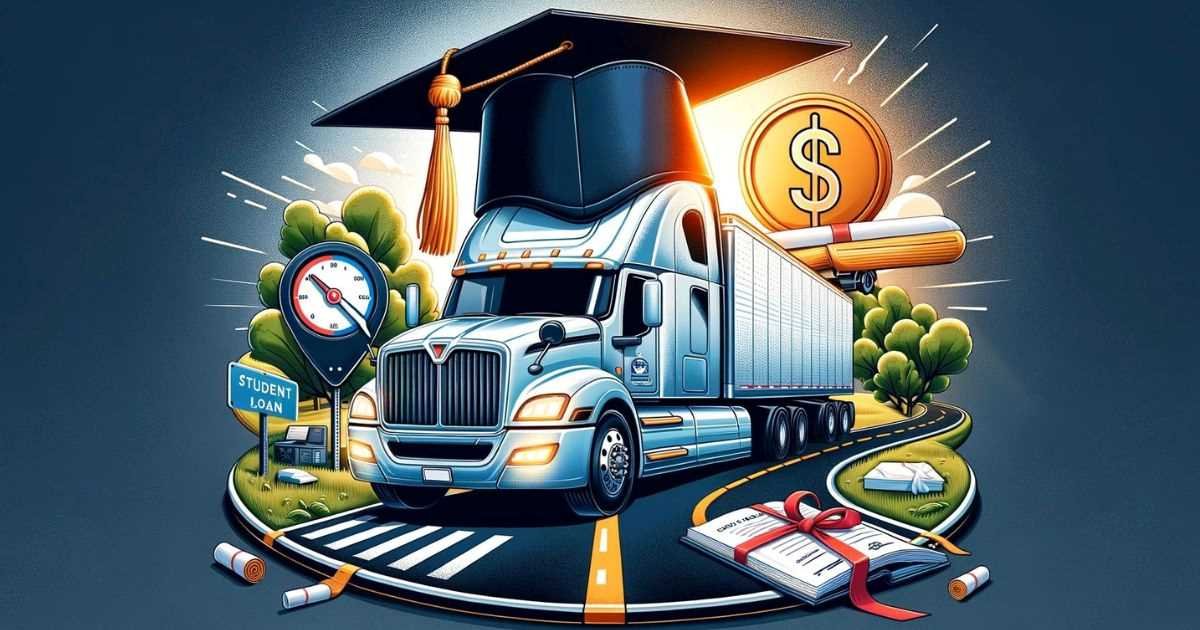Explore your options for financing CDL training with our guide on CDL student loan, including insights on federal aid, private loans, employer programs, and more.
Student Loan for CDL School
The open road beckons, the promise of adventure and a solid income calling. You’re ready to pursue your dream of becoming a truck driver, but the cost of CDL training can be a roadblock. Fear not, aspiring trucker! This blog will guide you through the world of CDL student loans, helping you chart the best course for financing your trucking education.
Federal Loans: A Bumpy Start, But Smooth Sailing?
Federal student loans are typically not available for CDL programs. However, there’s a glimmer of hope! If your chosen school participates in Title IV federal financial aid programs, you might be eligible for:
- Federal Direct Loans: These offer fixed interest rates and flexible repayment options. Subsidized (government pays interest while in school and during deferment periods) and unsubsidized (interest accrues from the start) loans are available.
- Federal Pell Grants: These need-based grants don’t require repayment and can significantly reduce your financial burden.

Private Loans: Explore with Caution
Private lenders often fill the gap where federal loans fall short. However, proceed with caution:
- Interest rates: These can be variable and significantly higher than federal loans.
- Repayment terms: Less flexible than federal loans, with stricter penalties for missed payments.
- Eligibility requirements: Stricter credit score and income requirements compared to federal loans.
Employer-Sponsored Programs:
Many trucking companies offer tuition reimbursement programs to attract and retain drivers. Explore potential employers who offer such programs, as they can significantly ease your financial burden.
Alternative Funding Options:
- Scholarships and grants: Research industry-specific scholarships and grants offered by trucking associations or companies.
- Military benefits: If you’re a veteran, explore potential benefits like the GI Bill for funding your CDL training.
- Savings and personal loans: Consider tapping into personal savings or traditional bank loans, but be mindful of interest rates and repayment terms.
Before You Borrow:
- Cost Comparison: Compare the total costs of different CDL programs, including tuition, fees, and living expenses.
- Budgeting: Create a realistic budget to understand your monthly expenses and how loan payments would fit in.
- Earnings potential: Research average starting salaries for truck drivers in your desired specialization to ensure you can comfortably manage loan payments.
Remember: Taking out a loan is a significant financial commitment. Weigh the pros and cons carefully, explore all funding options, and borrow only what you need. With careful planning and responsible borrowing, your CDL student loan can be the key to unlocking a rewarding career on the open road.
FAQs: Navigating CDL Student Loan
Q. Can I get federal student loans for CDL training?
A. Federal student loans are generally not available for CDL training programs. However, if your CDL training school participates in Title IV federal financial aid programs, you might be eligible for Federal Direct Loans or Federal Pell Grants.
Q. What are Federal Direct Loans and how do they work for CDL training?
A. Federal Direct Loans are government-backed loans with fixed interest rates and flexible repayment options. They come in two types: subsidized, where the government pays the interest while you’re in school and during deferment periods, and unsubsidized, where interest accrues from the time the loan is disbursed. Eligibility for these loans depends on your CDL school’s participation in federal financial aid programs.
Q. Are there any grants available for CDL training?
A. Yes, Federal Pell Grants may be available if your CDL training school participates in Title IV programs. Pell Grants are need-based and do not require repayment, making them an excellent option for reducing the cost of your training.
Q. What should I be cautious of when considering private loans for CDL training?
A. Private loans can have variable and higher interest rates compared to federal loans, less flexible repayment terms, and stricter eligibility criteria, including credit score and income requirements. It’s important to carefully review the terms and conditions before taking out a private loan.
Q. How can employer-sponsored programs help finance CDL training?
A. Many trucking companies offer tuition reimbursement programs to new drivers as an incentive to join their team. These programs can significantly reduce or even cover the cost of your CDL training, but it’s important to understand the terms, such as any commitment to work for the company for a specified period.
Q. What are some alternative funding options for CDL training?
A. Aside from loans, you can explore scholarships and grants specific to the trucking industry, military benefits like the GI Bill if you’re a veteran, or personal funding options such as savings and traditional bank loans. Each has its own set of pros and cons to consider.
Q. Before taking out a loan for CDL training, what financial aspects should I consider?
A. Before borrowing, compare the total costs of different CDL programs, create a realistic budget to understand your monthly expenses, and research the average starting salaries for truck drivers in your area. This will help ensure you can manage loan payments comfortably post-graduation.
Q. Is taking out a loan for CDL training a good investment?
A. Taking out a loan is a significant financial commitment that should not be taken lightly. However, with careful planning, responsible borrowing, and considering all funding options, a CDL student loan can be a valuable investment in your future career as a truck driver. Always ensure you borrow only what you need and have a plan for repayment.
Disclaimer: This blog is for informational purposes only and does not constitute financial advice. Please consult with a qualified financial advisor for personalized guidance.
Anurag is a personal finance blogger dedicated to helping readers take control of their money and build long-term financial freedom. Through practical insights on budgeting, investing, and smart money habits, he simplifies complex financial concepts for everyday people.

